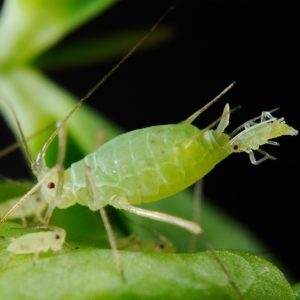
Aphids (of the order Hemiptera) have been around for more than 280 million years. While there were few species at this time, the appearance of flowering plants caused diversity and numbers to explode, as there are now more than 4,400 known species of aphid. Aphids are insect pests of cultivated (and non-cultivated) plants in temperate regions. These soft-bodied insects can do a great deal of damage because they are sap-sucking insects, which rob the plant of essential nutrients. In addition to sucking vital nutrients from plants, aphid saliva is toxic to plants. They also frequently transmit disease-causing organisms, such as viruses, to their plant hosts.
Some species of ant farm the aphids in order to protect the aphids from predators. They do this to have a steady supply of honeydew (aphid poop). Some ants go so far as to gather and store the aphid eggs in their nests over the winter. In the spring, the ants carry the newly hatched eggs back to the plants. This enables aphids to quickly grow in numbers, while the ants benefit from an easy food source. Insect predators of the aphid include ladybugs, parasitic wasps, and lacewings. These predators of the aphid are usually successful in keeping the sap-sucking pest at bay in a healthy, dynamic landscape.
Bernheim is proud to be a healthy forest, which provides a home to many creatures, even the smallest ones – insects. The Bugs of Bernheim is a blog series that will celebrate our six and eight-legged friends. Join us each year on the third Saturday in September at Bernheim’s annual BugFest, where you can see a variety of bugs, dance the buggy boogie, and even sample some tasty insect treats.

